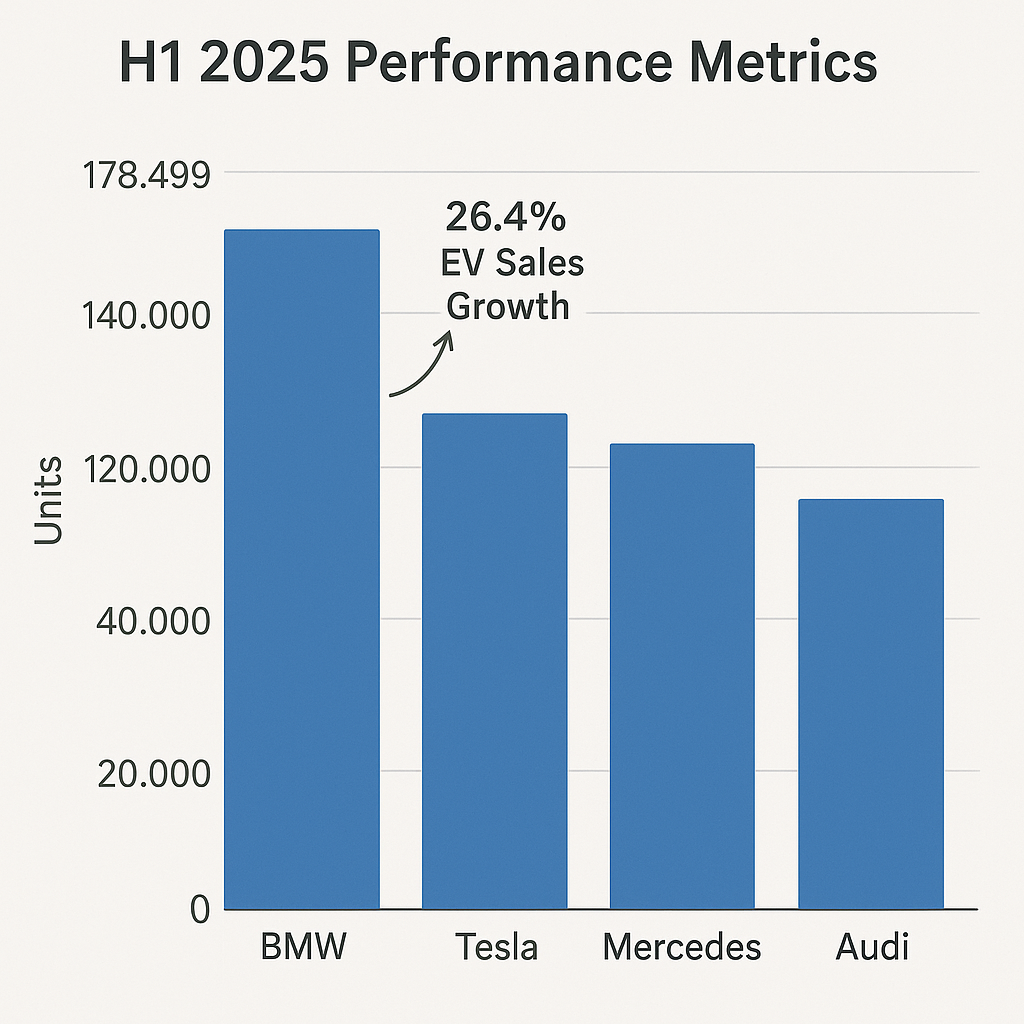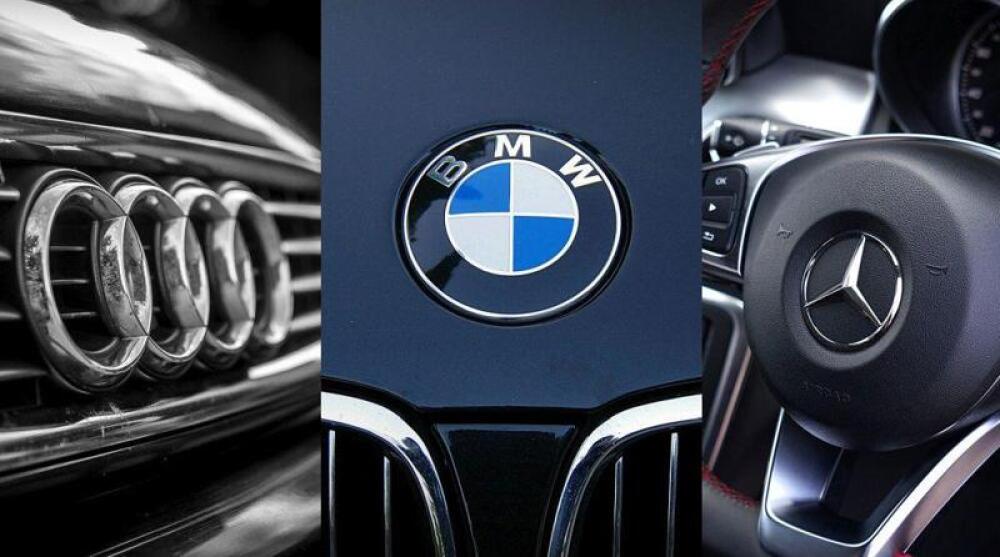BMW overtakes Mercedes and leaves Audi behind in 2025’s German premium car battle – what your business can learn from their winning strategy
BMW’s 2025 market dominance offers crucial lessons for small and medium businesses. The Munich-based company outmanoeuvred established competitors Mercedes-Benz and Audi through strategic flexibility, early electric vehicle adoption, and customer-focused innovation. Their approach demonstrates how businesses can thrive by adapting quickly to market changes whilst competitors stick to outdated strategies.
TL;DR for business owners: BMW’s success story shows that flexible strategy, early adoption of emerging trends, and focusing on customer satisfaction over tradition can help any business outperform larger, more established competitors. The lessons apply whether you’re running a tech startup or a family retail business.
BMW’s flexible strategy outsmarts rigid competitors
BMW’s 2025 success stems from strategic decisions that any business owner can adapt. While Mercedes-Benz and Audi committed to expensive, single-purpose strategies, BMW chose flexibility. Their platform approach allows the same product line to serve different market segments – conventional, hybrid, and electric vehicles – maximising efficiency and reducing risk.
Business lesson for SMEs: Don’t put all your eggs in one basket. BMW’s approach mirrors successful small businesses that offer multiple service tiers or product variants from the same core offering. A web design agency might offer basic websites, e-commerce solutions, and full digital marketing packages using the same team and infrastructure.
The numbers speak volumes. BMW sold 178,499 units in the US compared to Mercedes’ 142,000 and Audi’s struggling 81,951 units in the first half of 2025. Even more telling, BMW achieved 1.6% growth while Mercedes declined 6% and Audi plummeted 12%.
Early adoption pays dividends in competitive markets
BMW’s electric vehicle strategy demonstrates perfect timing and execution. They delivered 368,523 electric vehicles globally in 2024 – more than Mercedes-Benz (185,059 units) and Audi combined. This wasn’t luck; it was strategic planning executed years earlier.
Practical tip for entrepreneurs: BMW spotted the electric trend early but didn’t abandon their core business. They built electric versions alongside traditional models. Small businesses can apply this by gradually introducing new services while maintaining profitable existing ones. A traditional accountancy firm might add digital bookkeeping services without dropping tax preparation.
when it comes to the shock absorber for the BMW F30, the company’s modular approach allowed them to optimise components across multiple model lines, reducing costs and improving quality – a strategy any manufacturing business can adapt.
Customer satisfaction drives sustainable growth
BMW’s reliability improvements show the power of listening to customers. The 2025 J.D. Power study reveals BMW achieved 196 problems per 100 vehicles, significantly better than Mercedes (210) and Audi’s concerning 269 problems per 100 cars.
Key performance metrics every business owner should track
The following table shows how BMW outperformed competitors across critical business indicators that translate to any industry:
| Business Metric | BMW (Winner) | Mercedes-Benz | Audi (Struggling) |
| Market growth rate | +1.6% | -6% | -12% |
| Product innovation adoption (EV sales) | 368,523 units | 185,059 units | ~150,000 units |
| Innovation growth rate | +12% | -23% | +1.3% |
| Quality score (J.D. Power) | 196 problems/100 | 210 problems/100 | 269 problems/100 |
| Customer satisfaction | 748 | 774 | 761 |
| Service competitiveness (UK pricing) | ~£200 | £206.15 | £198.70 |
| Total cost efficiency | Moderate | High | Moderate |
These figures reveal BMW’s balanced approach to business growth. While Mercedes leads slightly in customer satisfaction (774 vs BMW’s 748), BMW’s superior market growth (+1.6% vs Mercedes’ -6%) and innovation adoption (+12% EV growth vs Mercedes’ -23% decline) demonstrate sustainable competitive advantage.
BMW’s 25% sales advantage over Mercedes-Benz and commanding 118% lead over Audi shows how strategic decisions compound over time. Their electric vehicle growth of 12% while Mercedes declined 23% proves that early investment in emerging markets pays substantial dividends.
Business insight: BMW didn’t choose between quality and growth – they improved both simultaneously. Small businesses often face this false choice, but BMW proves you can enhance quality while expanding market share through smart strategic planning.
Market performance comparison reveals strategic differences

Graph: Bar chart showing H1 2025 performance metrics
BMW’s 178,499 units versus competitors clearly illustrates the power of strategic flexibility. Their 26.4% EV sales growth in Q1 2025, led by the i4 model’s 57% increase, shows how businesses can create momentum through focused innovation while maintaining core profitable activities.
Cost management without compromising quality
BMW’s approach to cost management offers valuable lessons for businesses watching their margins. While BMW’s annual maintenance costs range from £1,200-£1,800 compared to Mercedes’ £900-£1,300, their superior reliability (196 vs 210 problems per 100 cars) means fewer unexpected repairs and higher customer satisfaction.
SME application: Sometimes charging premium prices is justified if you deliver superior value. BMW’s strategy shows that customers will pay more for products that perform better long-term. This applies whether you’re a plumber using quality parts or a consultancy investing in better software tools.
Innovation timing determines market leadership
BMW’s electric vehicle success wasn’t accidental. They invested in flexible platforms when competitors pursued expensive, dedicated strategies. This allowed BMW to respond quickly to market demands without massive additional investment.
Entrepreneurial lesson: Timing beats perfection. BMW didn’t wait for the perfect electric vehicle strategy; they started with flexible systems that could evolve. Small businesses should launch MVPs (minimum viable products) and iterate rather than waiting for perfect solutions.
Source of information – clementpreowned.com confirms that BMW’s strategic approach resonates with business buyers who value long-term planning over short-term gains.
Geographic expansion through strategic consistency
BMW’s remarkable achievement of overtaking Mercedes-Benz in Germany demonstrates how consistent strategy implementation across markets creates compounding advantages. Their success wasn’t limited to one region – they dominated in the US, UK, and even conquered their competitor’s home market.
Business scaling insight: BMW’s approach shows how small businesses can expand successfully. Instead of changing strategies for each new market, they adapted their core flexible approach to local conditions while maintaining strategic consistency.
Quality improvement drives competitive advantage
The reliability gap between BMW (196 problems per 100 cars) and Audi (269 problems) didn’t happen overnight. BMW systematically addressed quality issues while competitors focused elsewhere, creating sustainable competitive advantage.
Practical implementation: Document and address customer complaints systematically. BMW’s quality improvements came from treating each customer problem as valuable feedback rather than a cost centre.
According to AUTODOC’s extensive market analysis, BMW’s 2025 success demonstrates that businesses thrive when they balance innovation with operational excellence. Their flexible platform strategy, early electric vehicle adoption, and systematic quality improvements created multiple competitive advantages that compounded over time.
The key lesson for entrepreneurs: sustainable competitive advantage comes from making many good strategic decisions consistently, not from seeking one perfect solution.
Building sustainable competitive advantage through strategic planning
BMW’s 2025 triumph provides a masterclass in strategic business management that any entrepreneur can study and adapt. Their combination of flexible infrastructure, early trend adoption, systematic quality improvement, and consistent execution across markets created compounding advantages that overwhelmed larger, more established competitors.
For small and medium businesses, BMW’s example proves that strategic thinking and execution matter more than size or resources. Whether you’re launching a tech startup, expanding a family business, or pivoting an existing company, BMW’s approach offers proven frameworks for sustainable growth and market leadership.
Sources:
- J.D. Power 2025 Initial Quality Study
- BMW Group Sales Reports 2025
- Mercedes-Benz Sales Data H1 2025








